What does it mean for the Notre Dame community — its students, faculty and staff — to be doers, not merely speakers or hearers, of the call to Walk the Walk? As the campus paused January 18-22 to reflect on the values central to the legacy of Martin Luther King Jr. and the mission of the University, several speakers outlined possible next steps in what Notre Dame President Rev. John I. Jenkins, C.S.C., called “the journey of purpose we take together.”
Throughout the week, the Notre Dame community was asked to consider the question “What is your next step?” Tweet your answer using #NDwalkthewalk.
For video and more photos from Walk the Walk Week, visit diversity.nd.edu/walk-the-walk/.
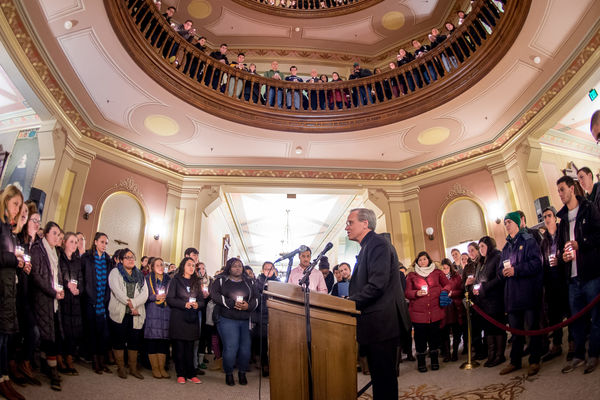
Lord God, You led your chosen people from slavery in Egypt to the freedom of the Promised Land. We ask you to lead us, this Notre Dame community, from any enslavement to hatred, ignorance, fear, racism, injustice or anything else that prevents us from being the community of love and respect that you want us to be.
We remember with gratitude today the witness of Dr. Martin Luther King Jr., and we ask that we have the courage and determination to follow his example in battling injustice and living the Gospel of love.
Help us, Lord, to make ever more the community you want us to be.
Grant all this through Christ our Lord,
Amen
-- Rev. John I. Jenkins, C.S.C., University president, at the midnight prayer service on January 18
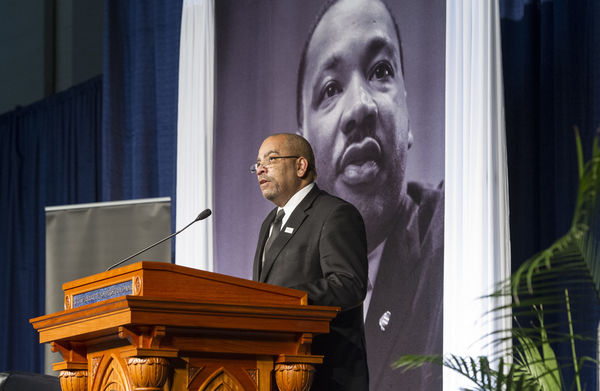
Our luncheon today is the second in a series of Walk the Walk Week events in which we are invited by our president, Father John Jenkins, and the President’s Oversight Committee on Diversity and Inclusion to reflect — as colleagues, friends and fellow travelers — on the pilgrimage of faith and social action we are called to undertake, a journey animated by the values embraced by Dr. King and that inform our day-to-day interactions with one another on campus. ...
The first of these several things this [Walk the Walk Week] effort should reflect is our collective resolve to become more fully a beloved campus community. The second is our commitment not simply to talk the talk about diversity and inclusion, but to walk the walk in truthfulness and in love. The third is our promise to work toward becoming a Notre Dame where everyone is welcome, where everyone is included, where everyone is valued. The fourth is our willingness to make this journey of ours an ongoing quest that begins this week, a quest that intensifies this semester, a quest that continues in perpetuity.
We are delighted, therefore, to welcome you here to begin walking together in 2016.
-- Hugh Page, University vice president, associate provost and dean of the First Year of Studies, master of ceremonies for the University's Martin Luther King Jr. Celebration Luncheon at the Joyce Center. The event was attended by more than 2,500 students, faculty and staff.
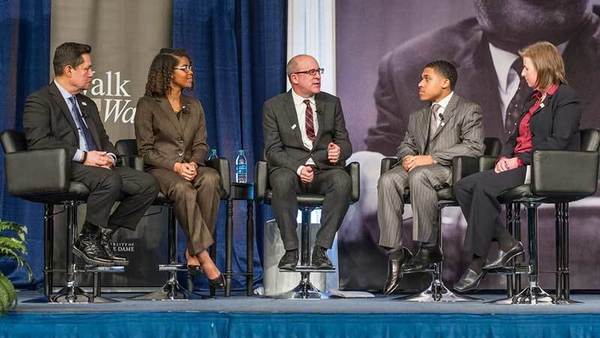
From my vantage point as a faculty member, I can look at my students and see that we’ve made progress. I can also look at my students and see we haven’t made enough progress. But I do know that having students of different backgrounds and different perspectives truly enhances our educational offerings. I also know that diversity itself is not enough if you don’t also have a Spirit of Inclusion. …
Community is at the heart of what we prize at Notre Dame. And our job, as faculty and staff and administrators, is to build up that community, be a place that welcomes people of different backgrounds and different perspectives, makes it a safe place for them to be who they are and to articulate those perspectives. Inclusion is important. Prizing difference is important. But also molding people and training people and teaching them that there’s a certain commonality that’s the most important of all, that each of us is created in the image of God and that each of us deserves a basic measure of human dignity, one and the same.
-- Jennifer Mason McAward (far right in above photo), acting director, Notre Dame Center for Civil and Human Rights, during a panel discussion at the Martin Luther King Jr. Celebration Luncheon on Monday, January 18.
Notre Dame should be cultivating leaders in this conversation [of diversity and inclusion issues] nationwide. Notre Dame should be very substantive in applying our Catholic character to our analysis of, and then response to, all of the issues that we’ve been talking about today because I think that Notre Dame, being a Catholic university, can add so much value to a conversation that can become very much divided along political lines and other issues. There is so much value that can come from scripture and from [Catholic social] tradition and the way that a Catholic education teaches you to approach problems — not in a way that is just political or along other types of divides, but really concerning the heart and matters of the spirit and matters of what it is that we should be doing as members of the body of Christ.
-- Katie Washington Cole (second from left in above photo), ’10, University trustee, during a panel discussion at the Martin Luther King Jr. Celebration Luncheon on Monday, January 18.
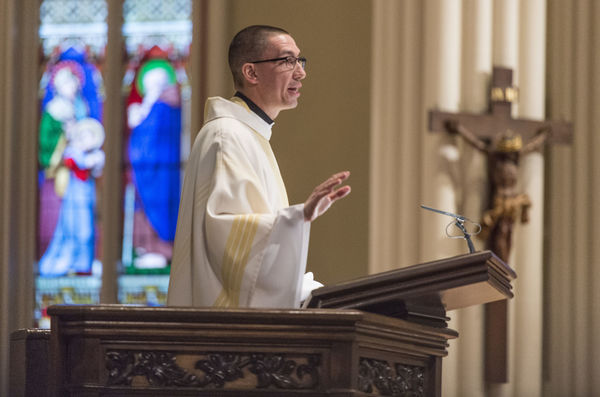
We are all too often quick to retweet some cause to demonstrate our support. To wear an article of clothing that speaks of solidarity or text donations to relief organizations. It’s quick and it’s relatively hassle free. These days, there’s so much talk about “awareness” or “driving the conversation” that we’ve failed to notice that these symbolic gestures don’t solve the core problems.
What this world needs more of is commitment. The investment of time and energy by caring, and committed men and women to an endeavor that is much larger than themselves. One that in all honesty will continue to present challenges after our time on earth is complete.
If we are not careful, this Walk the Walk Week is just one big gesture. To prevent such a tragedy from happening, we must commit ourselves to recalling the importance of living lives that seek to offer more than awareness, but real action toward revealing the glory or the Lord so that all of us may see it together. “And in that moment we will proclaim, free at last, free at last. Thank God almighty we are free at last.”
-- Rev. Pete McCormick, C.S.C., director of Campus Ministry, to more than 500 from the Notre Dame community who attended the Celebration Mass on Monday, January 18.
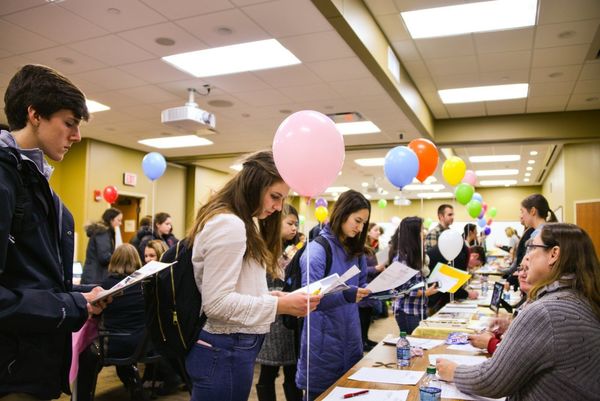
At the Social Concerns Fair, students learn more about engaging with the local community. They meet with representatives from the organizations directly and hear more from students who serve in social action clubs about how they can be contributing members to our local community and good civic participants.
We encourage students to engage in a semester of service instead of a day of service. Doing so provides an opportunity to be in solidarity and contribute to the common good for those whose lives are burdened by injustice, oppression and poverty, which is a reality for so many people.
-- Annie Cahill Kelly, director of Community Partnerships and Service Learning, Center for Social Concerns. More than 150 students attended the Center for Social Concerns Service Fair on Tuesday, January 19, according Kelly, and nearly 30 community organizations hosted tables at the event.
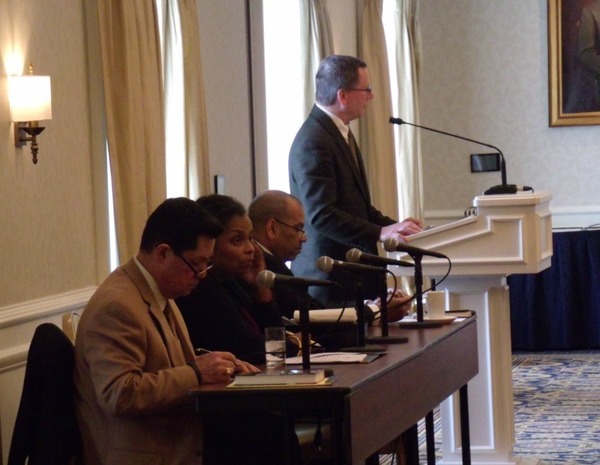
[In a 1990 Martin Luther King Jr. Day speech, Cesar Chavez said:] Dr. King was a powerful figure of destiny, of courage, of sacrifice and of vision. Few people in the long history of this nation can rival his accomplishment, his reason, or his selfless dedication to the cause of peace and social justice … Just as Dr. King was a disciple of Gandhi and Christ, we must now be Dr. King’s disciples. Dr. King challenged us to work for a greater humanity. I only hope that we are worthy of his challenge.
-- Timothy Matovina (pictured at podium), co-director of the Institute for Latino Studies, at the “Civil Rights Then and Now: African Americans and Latinos” lunch conversation on January 20. Matovina said the two civil rights icons had much in common, such as nonviolence, their faith and common focus on reclaiming humanity.
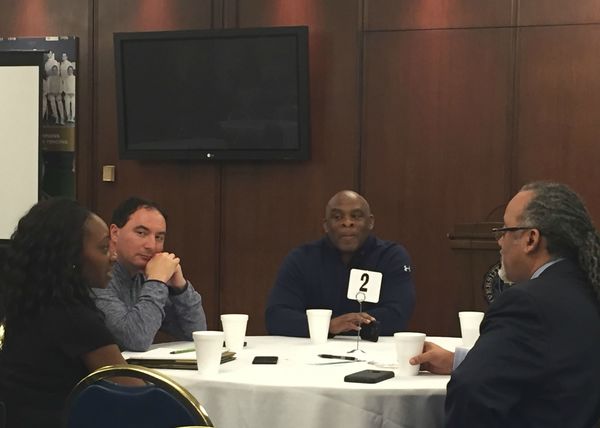
I haven’t always been the “diversity guy.” I’ve had some lapses in judgment here and there. But once I make a mistake, I learn ... and then I don’t make it again.
-- Eric Love (far right in photo), director of staff diversity and inclusion, at the Unity Summit on January 21, as he shared a time from his past when he discriminated against someone.